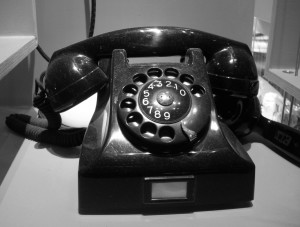Rotary phone? Sorry, don't want your business
Imagine this phone call between Bob, a very well off older gentleman, and Maude, a salesperson at a high-end travel agency:
- Bob: (click-click-click-click-click, ring, ring… ring, ring…)
- Maude: Travel Deluxe, good morning!
- Bob: Hi there, I’m interested in around-the-world cruises for myself, my wife, our 4 kids, their spouses, and 12 grandkids. I’d like to book right now if possible!
- Maude: Great, please press 5 on your phone to confirm your interest.
- Bob: I can’t do that, I’m calling you from a rotary phone.
- Maude: I’m sorry Bob, but we don’t want your business. Our systems are set up to work with touch tone phones only. Goodbye!
This would never happen, would it? Maude has a strong lead going and would never turn away a customer just because they’re using outdated technology. Nor would she ever ask Bob to have a new touch tone phone installed before they could continue. Yet parallels of this scenario happen all the time on the Internet.

The good old-fashioned rotary phone (license)
There’s a reason why the good old phone call is such a staple of business: It always works, regardless of how old or new the technology the customer on the other end is using.
Today, business is run more and more through the Internet, but unfortunately, businesses are turning away customers all the time simply because they are using outdated technology to connect to the Internet.
January marked the “death” of Internet Explorer versions 8, 9 and 10, as Microsoft has ended support for these browsers. But what does that really mean? Let’s take a realistic look. According to some reports, these versions of Internet Explorer together currently represent a bit over 19% of web usage from desktop computers. How quickly can we realistically expect that to change? The much older Microsoft Internet Explorer 6, released in 2001, still has about 0.5% share, even after Microsoft itself has been trying to kill it for 5 years. That’s 1 out of every 200 customers, and that one customer could be a whale like Bob.
It’s important to choose your tools carefully to avoid turning away valuable customers, and to avoid making them feel bad about not being tech savvy enough to download the latest browser, or install a screen sharing application, just so they can do business with you.
While it’s often the right choice for the latest and greatest web application to require the most modern browser and ask customers to upgrade if they visit using an older browser, sites that are primarily about selling a product or service or supporting existing customers should cater to everybody if possible.
Similarly, when choosing communication tools, it’s important to be mindful of whether they will work for all of your customers. Do the emails your company sends work well for customers with text-only or Braille email readers? Does your screen-sharing solution require your customer to download and install a complex piece of software, or will it work with whatever browser they happen to have installed? What about when they’re on their smartphone?
Click here to sign up and download a completely free checklist and compatibility guide to see how well your communications solutions will work with your customers who may have older technology to access the Internet, and to help you optimize your Internet presence.
In closing: We should expect Internet Explorer versions 8, 9 and 10 to still be fairly widely used for several more years. A lot of your more affluent customers are likely to be less tech savvy, and they won’t know what to do when prompted to upgrade their browser, or install a piece of software. You still want their business, don’t you?
